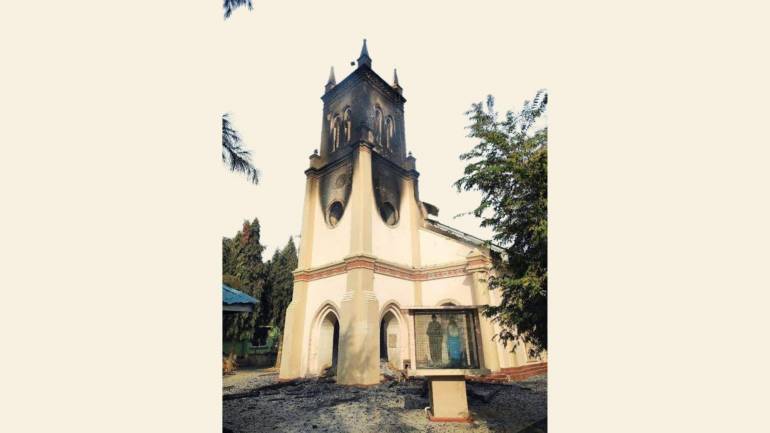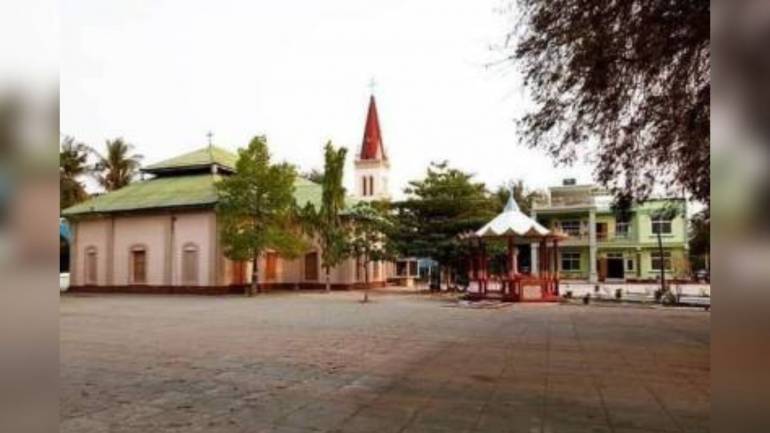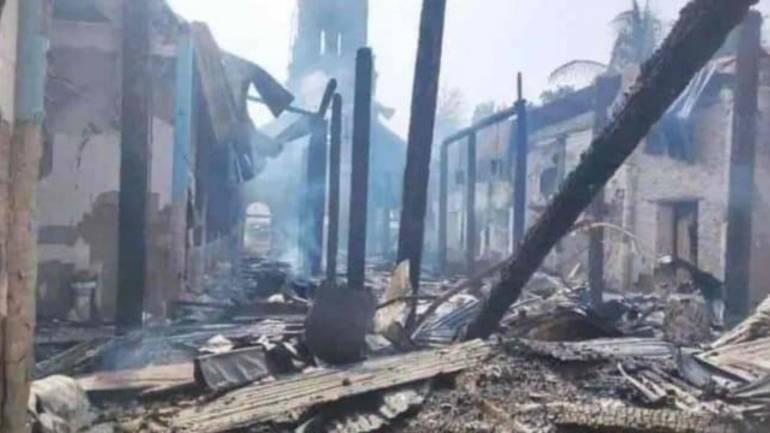Churches under attack in Myanmar: A Grim Reality

Catholics were taking refuge in the church for safety as the fighting between the Burmese troops and the resistance forces escalated.
Destruction of Churches Since 2021
Churches, as cultural properties, are highly protected under International Humanitarian Law. During wars, participants in the conflicts are prohibited from attacking places of worship.
This protection is covered by the 1954 Hague Convention for the Protection of Cultural Property in the event of armed conflicts.
But arson and airstrikes have destroyed more than 60 churches, including Buddhist temples in Myanmar, since the military junta rose to power after deposing democratically elected leaders in February 2021.
In January 2023, the century-old Assumption Church in the Archdiocese of Mandalay in Sagaing region was set on fire by the Burmese army. The flames burned the church down. Yes, completely destroyed.
Fortunately, no villagers were hurt, as they quickly escaped before the soldiers arrived.
The nuns were also forced to flee together with 3,000 villagers. The village was also set on fire by the Burmese army. About 500 houses were eaten by flames to the ground.
The military junta suspected resistance forces were hiding in this area.
The Christ the King Cathedral in Kayah, a state in eastern Myanmar, was also attacked.
In a statement, Bishop Celso Ba Shwe of the Loikaw diocese claimed that 120mm artillery shells frequently struck the chapel roof of the pastoral center. Its ceiling was damaged.
He and his priests pleaded with the military to refrain from shelling religious sites, but the attacks did not stop.
The bishop and some of his priests left for safety following attempts to seize the cathedral in November 2023. The Burmese army took over the cathedral and turned it into their stronghold against the resistance forces, known as Karenni People's Defense Force.
The Sacred Heart Church, also in Loikaw, was fired at with artillery shells. Catholics were taking refuge in the church for safety as the fighting between the Burmese troops and the resistance forces escalated. Four civilians taking refuge in the church were killed by the attack.
The assault also damaged the ceiling, the cross, and the roof of the church.
In August 2023, the Mary Mother of Mercy Church in the Diocese of Loikaw was struck by airstrikes, destroying the ceiling and windows.
Isolated cases? Obviously not.
The Catholic communities in Kayah and the diocese of Loikaw have been reported as heavily attacked areas.
Humanitarian Impact
No less than 107 religious structures, including 67 churches, and five Buddhist monasteries, have been destroyed in Chin alone, according to Chin Human Rights Organization.
Chin is a state in western Myanmar, bordering the Indian states of Mizoram to the west and Manipur to the south. As of 2014, more than 90 percent of this state were Christians. Buddhists represented 8 percent of its population.
The Catholic communities in Kayah and the diocese of Loikaw have been reported as heavily attacked areas.
The 2023 International Commission of Jurists reported that 94 Buddhist religious sites and 87 Christian structures across the country have been destroyed since the 2021 the military seized power.
The United Nations Office of the High Commissioner for Human Rights reported in March 2023 that the conflict displaced more than 1.3 million people and over 3,000 civilians were killed.
Myanmar, known as Burma until 1989, was also ruled by a military junta from 1962 to 2011. Its road to democracy began in 2010 that led to free elections in 2015 and the establishment of a government led by Aung San Suu Kyi, a Nobel Peace Prize laureate.
Suu Kyi was instrumental in Myanmar's transition from military junta to partial democracy in the 2010s.
Suu Kyi was serving as State Councilor of Myanmar (equivalent to prime minister), when the military deposed her by a coup in 2021.
In 2017, as an elected leader of Myanmar she was criticized for her silence over the genocide of Rohingya, a Muslim minority in her country. Her critics called for the revocation of her Nobel prize.
In February 2021, Suu Kyi was arrested and deposed.
In 2023, she was charged with multiple offenses, including violation of the official secrets act, and corruption. On several occasions, she was sentenced to serve years in prison for different offenses. Her final sentence was 33 years in prison, but was later cut down to 27 years.
The United Nations, the United States, and European countries denounced her arrest, charges, and sentences as politically motivated.
In 2019, two years before the military seized her power, Suu Kyi defended the military against allegations of the massacre of the Rohingya at the International Court of Justice.
Myanmar, a Buddhist country and the largest in Mainland Southeast Asia by land area, is home to about 750,000 Catholics out of its 55 million population.
Most of the Catholics in Myanmar live in Kayah state. This state has been the target of most of the attacks by the military junta. Loikaw is the capital of Kayah.
In his homily at the Basilica of St Peter in Rome in May 2021, Pope Francis told the faithful in Myanmar that “it is not easy to lift our gaze when we are hurting, but faith helps us resist the temptation to turn in on ourselves.
"We may want to protest, to cry out to God in our pain. We should not be afraid to do so, for this, too, is prayer.”
He also said that “an elderly woman once said to her grandchildren: ‘being angry with God can also be a form of prayer.’"










